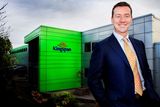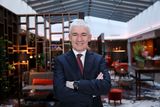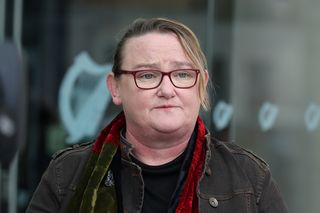Reaping the fruits of her labour: from Tipperary farm to head of health giant
As CEO of the global health brand Bupa and a non-exec BoI director, Evelyn Bourke has quietly risen to the top, writes John Reynolds
Evelyn Bourke. Photo: George Brooks
Milking cows, caring for calves and walking greyhounds as she contributed to her parents' efforts to turn around the ailing family farm in Drom, Co Tipperary, gave Evelyn Bourke an early sense of what it takes to run an enterprise.
These days, she's the chief executive of British health giant Bupa, having joined as the CFO in 2012, overseeing what some readers may know as a health insurer but which has become a global healthcare business employing more than 78,000 people. She's also just taken a non-executive director role involving 36 days a year at Bank of Ireland, alongside bank CEO Francesca McDonagh.
Some of the Bupa numbers give a further sense of the scale of Bourke's role. Turnover last year was £12.2bn (€13.9bn), while profit - which gets reinvested in the company every year - was £805m (€916bn).
Its workforce is approaching that of Irish building materials giant CRH, but it has about half the turnover. To put it another way, it has slightly more than twice Ryanair's turnover, but about seven times as many staff. In short, her role is a significant one.
The organisation was established in Britain in 1947, and is an entity that has no shareholders, but is limited by guarantee, so its reinvestment every year enables it to grow and continue to improve its healthcare offering. Nor is she its first Irish boss - there were two others previously, Bob Graham and Ray King, she recalls.
One of the world's largest dental companies, it has 949 clinics - including 20 Smiles Dental ones here in Ireland, which were part of an acquisition - and Bourke is also in charge of 17 hospitals, 345 medical clinics and 317 nursing homes and 61 care villages.
Bourke (53) retains her Tipperary lilt. Bupa's bright and airy headquarters are in the heart of the City of London, close to the Bank of England. Across the street is also a tired-looking former AIB office awaiting new tenants.
Bourke is no stranger to having her photo in the Sunday Independent, early in her career she made the news on qualifying as one of the first two female actuaries in Ireland. Fast forward to January this year and Bupa proudly tweeted photos of her and a number of other CEOs of British firms on UK Prime Minister Theresa May's trade mission to China, while last month she was pictured with Foreign Secretary Boris Johnson, as they opened a new 400-bed hospital Bupa has built in Chile.
"The China trade mission was fascinating. I only got a chance to interact with Theresa as part of our group, rather than share a more private chat with her. As you'd expect, her schedule was jam-packed. You have to hand it to her, in that she's absolutely tireless in trying to do the right thing for Britain," Bourke says.
Bupa is interested in finding a partner with an established customer network to work with in China, while the business already operates in Chile and Brazil, and is keen to expand in Latin America, with a particular interest in Colombia.
"We're interested in economies with a strong emerging demand for healthcare, that are growing well with an emerging middle class, and a government that's supportive of private health provision and insurance," she adds.
Bupa previously provided health insurance here, but the business was sold to Quinn Insurance in 2007, and there are no plans to re-enter that market.
While Bourke's role does involve a degree of travel, she has more time to do this and get out on the frontline to meet with staff, such as emerging leaders in the business, as well as dentists, nursing home workers and newly qualified young doctors, particularly during the second quarter of a year, and then regularly across the rest of the year, she enthuses.
Could Brexit have an impact on the organisation's ambitions to expand? "There will be some operational and legal impacts for Bupa once the UK leaves the EU, but we are well advanced with plans to respond to its impact. Personally, I think corporate Britain just has to get on with it. The uncertainty about the rules of how we will trade is unhelpful. Like any other business, we would welcome some clarification on that," she says diplomatically.
There are other challenges ahead as well, she explains. Bupa has a toe in the water in the area of digital health with HealthTap, a medical advice app that facilitates a webchat or video call with a doctor after it has helped you figure out what might be causing various symptoms. "We have a lot of work to do to see how we can bring it to different markets and make it work in their regulatory environments."
The organisation also invites digital health startups to pitch for an opportunity to work with it to refine their business propositions, with a view to a possible investment. A partnership in the US with Sandbox, a venture capital fund and a corporate medical insurance partner - though it doesn't provide health insurance to the public in the US - also brings the opportunity to screen various investment opportunities.
She's also very conscious she has a role at Bank of Ireland at a time when McDonagh navigates scaling back its operations while trying to deploy technology to meet customer service expectations, notwithstanding other issues such as the terrible consequences of the mortgage arrears scandal.
"Communities and businesses need banks that are well connected into the local social fabric and know their customers. Notwithstanding the changes in recent years, I think banks in Ireland are still better connected on the ground than perhaps UK banks are. It's important they don't lose that connection.
"I am aware of the mortgage issues Francesca is dealing with, and I know she is committed to putting things right for the affected customers. I'm supportive of her efforts to improving the customer experience, which is crucial and having much better engagement with the bank's employees who maintain those customer connections."
Both Bupa and Bank of Ireland are navigating a landscape of disruption. In banking, all areas - from payments, currency exchange and savings to wealth management and share dealing - are being shaken up by tech startups. "The challenge is to make sure that digital doesn't cause us to be distanced from the customer too much."
Is Bourke concerned that Bupa might lose traction to a more nimble Uber or Amazon of healthcare or health insurance, perhaps - who might beat it to a share of the market?
"Bupa's approach to digital health is pragmatic. New services need to be integrated and work alongside our existing services, otherwise they don't get traction. We are always looking to digitise processes that enhance people's customer experience. We continually take stock of the potential for disruption in healthcare. We can't be complacent.
"Healthcare and health insurance are highly regulated sectors, meaning they're slower to change. Where digital innovation can make a real difference to staying close to our customers and improving their experience as we help them to be healthy, we will embrace that."
The business is already looking at how it can better appeal to millennials, who think more about health and health insurance as they have families. Dental service and health advice along a subscription model are part of that.
Reacting swiftly to customer demand is key in her mind, she emphasises, adding that the UK health insurance offering was recently extended to offer better mental health support and access to cognitive behavioural therapy, because corporate customers raised a concern about a rise in the numbers of staff suffering from stress.
Artificial intelligence in healthcare will play an increasing role too, she explains. It and digital transformation are increasingly areas staff ask her about at question and answer sessions she takes part in on her visits to Bupa's global outposts, as well as how she manages her time in terms of work-life balance.
Last week, a report that AI can detect skin cancer better than humans, gained particular traction in the media. "AI can very robustly analyse huge volumes of data and look for discrepancies. That just tells you there's a discrepancy, and you still need human experts to interpret that. I don't see AI as replacing those experts," she says.
"When you think about how much it costs to train doctors, we can use AI and some aspects of digital health to improve efficiency and take out work that's repetitive or boring. It should help us ensure people have more rewarding jobs, and can do what they are best at, talking to other people, empathising and supporting them at difficult times.
"Looking at the future of healthcare, there aren't enough clinicians relative to the demand for care. We're going to have to find technologies that help them to look after the needs of larger groups of people.
"Ageing populations, more chronic disease, and medical advances coming thick and fast - which is great at one level, because they'll cure people and save lives. But also a lot of them are being adopted before they're fully medically evidenced.
"All governments are looking for the nirvana of an optimal health insurance system. The reality is there probably isn't a universal one that can be copied by every country and work really well. Our philosophy is that there's a role for private operators alongside governments."
Asked about the recent cervical cancer scandal here in Ireland, and whether Bupa outsources its diagnostic testing at all, she empathises at the human cost. Patients of Britain's NHS are also dealing with the consequences of a similar situation related to breast cancer scans, of course.
"On a human level, all you can do is relate to the terrible human costs of those mistakes. We outsource some diagnostic testing to proven, trusted providers who meet our high clinical standards. Of course, we undertake careful due diligence before working with any providers to ensure they meet the standards required by both Bupa and our customers. Our reputation is everything. We have clinical standards and a medical function that oversees those standards."
It's not difficult to imagine Bourke herself being a doctor. She comes across as methodical, confident, with an instinctive ability to guide and work and empathise with people.
"I have a sister who is a nurse. Other relatives in the family are nurses too. My brother is a farmer, and three of my sisters are married to farmers, but I never considered it as a career. But I helped out on the family farm, as all my siblings did when we were growing up. My dad was a bit of an entrepreneur. He got a bank loan to buy a combine harvester and do contract work. He also bred greyhounds and produced some top-class runners. I was conscious of how they transformed the farm through sheer hard work and what was clearly business acumen.
"After my Leaving Cert, I was clearer about what I didn't want to do, than what I did. I felt that I didn't want to be a teacher or a doctor. I thought about studying science at university, but I think even that route would have led me into business."
Bourke's CV above gives a sense of the long career path that has taken her to the top. Don't be surprised if her next step is another top job in banking, insurance or healthcare. The public sector would be lucky to have her, though there's a sense she relishes commercial challenges.
She enjoys taking the time to swap advice with current and former colleagues, name-checking a former boss at Standard Life, Alison Reed, who remains a friend and mentor.
Her career has come full circle in one sense. Insurance and pension provider New Ireland was owned by the bank, which then started life insurance provider Lifetime Assurance. The latter was also where she met her husband Seamus, as fate would have it.
Though Bourke didn't go to university, her career has had no shortage of learning opportunities, some tougher than others. "When I started at New Ireland, we did everything from calculating the premiums for policies, annual valuations of assets and liabilities, pension fund scheme valuation and unit fund pricing. We also worked with the sales and marketing team, IT and pensions departments, so I got a great sense of all the activities of the business."
After eight years in Dublin, she moved to London in 1990 and joined Tillinghast, a US specialist management consultancy that mainly employed actuaries doing strategic work, various studies and M&A and demutualisation work - a role she enjoyed for 10 years.
"With consulting, you diagnose and advise, but then step back. I decided I wanted to get back into a corporate role with more responsibility."
She joined Nascent, an early-stage pan-European insurance and financial advice firm - with a fledgling financial advice business in Italy, an insurance arm in Dublin and a funds arm in Luxembourg - that was backed by FTSE-listed St James's Place and some private equity firms.
"In light of the burst tech bubble, the Enron scandal and 9/11, 2001 wasn't the ideal time for us to suggest to Italian investors that they invest in equities.
"Though our headline growth in revenue wasn't too bad, the business deviated so far from the original business plan that it was burning through our startup money too fast.
"In the space of 18 months, I went in as the financial director thinking this was a really successful business, to finding it needed recapitalising and some rethinking of its strategy. Ultimately, we had no option than to wind it up after failing to find a buyer for it.
"It was a very, very punishing experience. I got really whacked. But it was the most intense learning experience that I've had."
It also afforded her the opportunity to learn from working alongside St James's Place co-founder and chairman Mark Weinberg, who had set up two other successful insurance firms, Abbey Life and Allied Dunbar.
"He was a great operator at a strategic level, and calm in a crisis; a great source of advice. His management of our stakeholders in difficult situations was very helpful to observe and learn from."
In her current role, and having learned from other bosses and colleagues throughout her career, it's clear that she takes a similar approach and in turn passes on much of that knowledge as well.
Name
Evelyn Bourke
Age
53
Position
CEO, Bupa; Non-executive director, Bank of Ireland
Lives
Beckenham, south London
Education
MBA, London Business School
Previous experience
Various roles including CFO: Friends Provident / Friends Life Group;
Director / CFO, Standard Life;
CEO, Chase de Vere;
FD, St James's Place;
Principal, Tillinghast Towers Perrin;
Marketing manager, Lifetime Assurance (part of BoI);
Trainee actuary, New Ireland Assurance
Family
Married to husband Seamus, who has two grown-up sons
Pastimes
Supporting European Championship and Six Nations rugby, travel
Currently reading:
An American Wife, by Curtis Sittingfield, and Full Circle by Erin Callan
Last box set:
Se quien eres (I Know Who You Are)
Favourite health-related app:
Pacer (for counting steps)
Join the Irish Independent WhatsApp channel
Stay up to date with all the latest news














